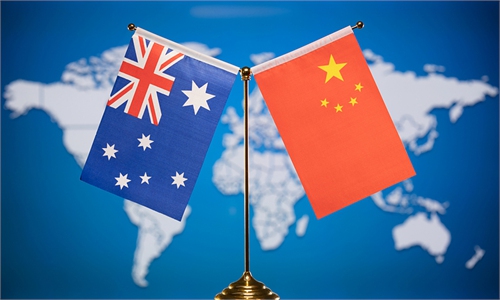Positive signals found in Aussie and NZ PMs' talks on China, as 'cooperation is in the interests of all parties'

New Zealand Prime Minister Chris Hipkins, center left, and Australian Prime Minister Anthony Albanese hold a joint press conference in Parliament House in Canberra, Australia, Feb. 7, 2023. Photo: VCG
While the prime ministers of Australia and New Zealand's talk about China-related issues on Tuesday has reportedly shown some positive signals of "strengthening ties with their biggest trading partner," experts said that Australia needs to cooperate with China rather than engage in unnecessary confrontations.
According to Reuters, Australian Prime Minister Anthony Albanese and his counterpart New Zealand Prime Minister Chris Hipkins said they discussed climate change, security, migration and the economy at their meeting in Canberra on Tuesday.
When addressing issues about China, Albanese said he was pleased by the "productive" video meeting between Trade Minister Don Farrell and Chinese Commerce Minister Wang Wentao on Monday, where it was agreed that Farrell would soon travel to Beijing.
Albanese said that trade with China is more than the next three highest trading partners combined. "It's in Australia's national interest to have good economic relations and to trade with China," he added.
Hipkins said China was "an incredibly important partner" for New Zealand.
Observers believe that the new Australian government's change of attitude toward China will help Australia safeguard its own interests.
The previous Australian government's going against the tide of history and following the US' anti-China strategy damaged China-Australia relations, and caused serious harm to Australia's national interests, Chen Hong, director of the Australian Studies Center at East China Normal University, told the Global Times on Tuesday.
On the other hand, the two countries are now emerging from the shadows of the epidemic and it is of utmost importance to improve relations with China, Australia's largest trading partner, Chen said. "After three years of accumulated demand, Australia has high expectations for China in areas such as tourism and studying abroad, hoping to inject strong momentum into Australia's economy. In order to play a role in the region, Australia needs to cooperate with China rather than engage in unnecessary confrontations, which is also beneficial to the development of the region," Chen noted.
However, some experts warned that it is impossible for Australia to turn from an extreme negative stance to a positive one at a time when the US has been very strict in containing and suppressing China.
Ning Tuanhui, an assistant research fellow at the China Institute of International Studies, told the Global Times that the Albanese government may consider the domestic resistance from some politicians and opposition parties when adjusting its China policy.
"But it can be predicted that the trade disputes between the two countries will gradually start to be eased and resolved through dialogue," Ning said.
Different from Australia, New Zealand's foreign policy and China policy are characterized by independence and maturity and adhere to the principle of serving its own interests.
Albanese also said during the meeting that further details about the AUKUS submarine deal between the US, Britain and Australia would be announced soon.
On the one hand, Australia wants to strengthen contact and enhance economic cooperation with China, but on the other hand, it also wants to strengthen military cooperation with the US to maintain the balance, Ning said.
Therefore, it is important for China to maintain an open and balanced attitude, experts said.

